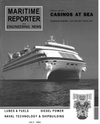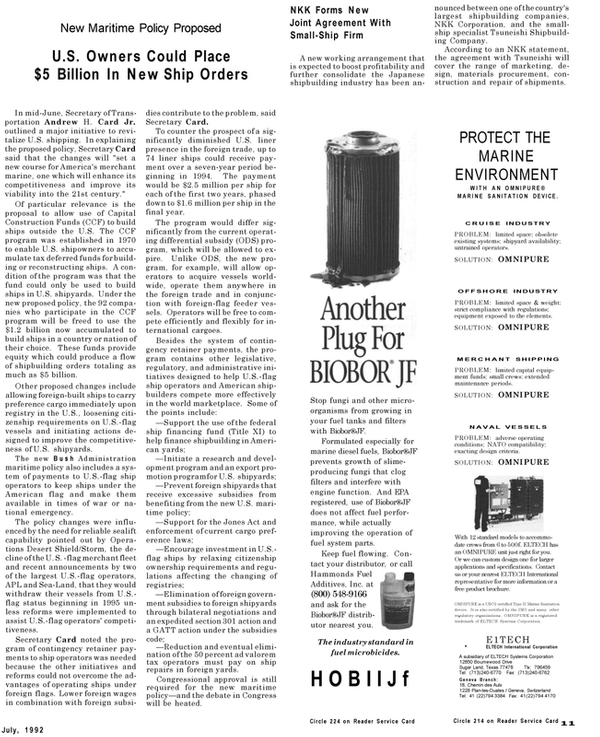
U.S. Owners Could Place $5 Billion In New Ship Orders
In mid-June, Secretary of Transportation Andrew H. Card Jr.
outlined a major initiative to revitalize U.S. shipping. In explaining the proposed policy, Secretary Card said that the changes will "set a new course for America's merchant marine, one which will enhance its competitiveness and improve its viability into the 21st century." Of particular relevance is the proposal to allow use of Capital Construction Funds (CCF) to build ships outside the U.S. The CCF program was established in 1970 to enable U.S. shipowners to accumulate tax deferred funds for building or reconstructing ships. A condition of the program was that the fund could only be used to build ships in U.S. shipyards. Under the new proposed policy, the 92 companies who participate in the CCF program will be freed to use the $1.2 billion now accumulated to build ships in a country or nation of their choice. These funds provide equity which could produce a flow of shipbuilding orders totaling as much as $5 billion.
Other proposed changes include allowing foreign-built ships to carry preference cargo immediately upon registry in the U.S., loosening citizenship requirements on U.S.-flag vessels and initiating actions designed to improve the competitiveness of U.S. shipyards.
The new Bush Administration maritime policy also includes a system of payments to U.S.-flag ship operators to keep ships under the American flag and make them available in times of war or national emergency.
The policy changes were influenced by the need for reliable sealift capability pointed out by Operations Desert Shield/Storm, the decline of the U.S.-flag merchant fleet and recent announcements by two of the largest U.S.-flag operators, APL and Sea-Land, that they would withdraw their vessels from U.S.- flag status beginning in 1995 unless reforms were implemented to assist U.S.-flag operators' competitiveness.
Secretary Card noted the program of contingency retainer payments to ship operators was needed because the other initiatives and reforms could not overcome the advantages of operating ships under foreign flags. Lower foreign wages in combination with foreign subsidies contribute to the problem, said Secretary Card.
To counter the prospect of a significantly diminished U.S. liner presence in the foreign trade, up to 74 liner ships could receive payment over a seven-year period beginning in 1994. The payment would be $2.5 million per ship for each of the first two years, phased down to $1.6 million per ship in the final year.
The program would differ significantly from the current operating differential subsidy (ODS) program, which will be allowed to expire.
Unlike ODS, the new program, for example, will allow operators to acquire vessels worldwide, operate them anywhere in the foreign trade and in conjunction with foreign-flag feeder vessels.
Operators will be free to compete efficiently and flexibly for international cargoes.
Besides the system of contingency retainer payments, the program contains other legislative, regulatory, and administrative initiatives designed to help U.S.-flag ship operators and American shipbuilders compete more effectively in the world marketplace. Some of the points include: —Support the use of the federal ship financing fund (Title XI) to help finance shipbuilding in American yards; —Initiate a research and development program and an export promotion program for U.S. shipyards; —Prevent foreign shipyards that receive excessive subsidies from benefiting from the new U.S. maritime policy; —Support for the Jones Act and enforcement of current cargo preference laws; —Encourage investment in U. S.- flag ships by relaxing citizenship ownership requirements and regulations affecting the changing of registries; —Elimination of foreign government subsidies to foreign shipyards through bilateral negotiations and an expedited section 301 action and a GATT action under the subsidies code; —Reduction and eventual elimination of the 50 percent ad valorem tax operators must pay on ship repairs in foreign yards.
Congressional approval is still required for the new maritime policy—and the debate in Congress will be heated.
Read U.S. Owners Could Place $5 Billion In New Ship Orders in Pdf, Flash or Html5 edition of July 1992 Maritime Reporter
Other stories from July 1992 issue
Content
- Markey Machinery Supplies Hawser Winch For LOOP Emergency Response Vessel page: 9
- Siemens Division Supplies Integrated Electric Propulsion System For B.C. Ferry page: 9
- $75 Million Cable Ship Launched By AT&T/ Teleglobe At FELS page: 10
- U.S. Owners Could Place $5 Billion In New Ship Orders page: 11
- Stolt-Nielsen Adds Two Inland Tankers; Acquires Comex Services page: 12
- New Oceanographic Ship Christened By MSC At Avondale page: 13
- Shaver Awards Z-Drive Tug Contract To Martinac page: 13
- Atlantic Marine Delivers 1,200-Passenger 'Empress/ New Illinois Casino Boat page: 14
- U.S.-FLAG CRUISING: READY TO SAIL? page: 16
- Unitor Offers Shipowners CFC 'Phase-Out7 Concept page: 19
- DIESEL POWER page: 21
- Great Lakes Towing Overhauls Army Tug, Expands Yard Facilities page: 28
- FMC Seeks Comments On Exempting Military Rates From ' 8 4 Ship Act page: 29
- Lugger Diesels Give Passenger Boats Economical High Speed page: 32
- CG Says New Regulations Will Remove Substandard Tankers And Operators page: 32
- Future Repair & Modernization Of U.S. Navy Ships page: 33
- Distribution Of Navy Repair Work page: 34
- ECO Delivers Two PC Ship Simulators To Navy page: 36
- Eighth LSD Class Ship Commissioned At Avondale page: 37
- ANNUAL GUIDE TO FUELS and LUBES page: 38
- COMSAT Introduces C-Linksm Dial-In Service page: 46
- NOR-FISHING '92 page: 48
- Soaring Shipbuilding Demand To Challenge Shipyard Capacity page: 49
- CREDIT IN THE BUNKER BUSINESS Pitfalls, Problems, Techniques And Solutions page: 52
- Singapore's Marine Industry Posts $ 1 . 9 Billion Growth page: 52
- Singapore Buys $12 Million VTS From Norcontrol page: 54
- FMC Issues Notice For 3 Proposed Rule Changes page: 54
- Fire Safety Actuators From N e w Joint Venture/ Stockham-Ficotech page: 55
- Siemens Launches New Industrial Systems Division page: 55
- Singmarine Launches One Of WorlcTs Largest Well Stimulation Vessels For The Western Company page: 55
- Mar Ad's Management Control Over Title XI Vessels page: 56
- HEIDRUN —A Breakthrough For Concrete Technology page: 58
- AWSC Helps 2nd-Tier Shipyards Comply With U.S. Disabilities Act page: 60
- PPM Cranes To Produce First U.S.-Built Container Reach Stacker page: 60
- SECONDHAND SHIPS: Market Sector Prospects And Investment Options During The 1990s page: 61
- Ashtech Ranger Receiver: Compact GPS Solution page: 62
- HMS Marine Introduces Halon Containment Curtain page: 62
- North Sea To Black Sea Waterway Set To Open page: 63
- New Marine Turbine For Fast Ferries From Solar Turbines page: 64
- Edson Offers Free Diaphragm Pump Catalog page: 64
- Leevac To Build Casino Boat To Rodney E. Lay Design page: 65
- Finnyards Receives 2nd $130 Million Multipurpose Icebreaker Order page: 65
- Futuristic Radisson Diamond: 21st Century Cruise Ship Delivered By Finnyards page: 66
- Flender Werft Delivers 1,724-TEU Boxship page: 67
- Lakes Shipping Affected By Low Water Levels page: 67
- MarAd Publishes Final Rule On Regulated Transactions page: 68


